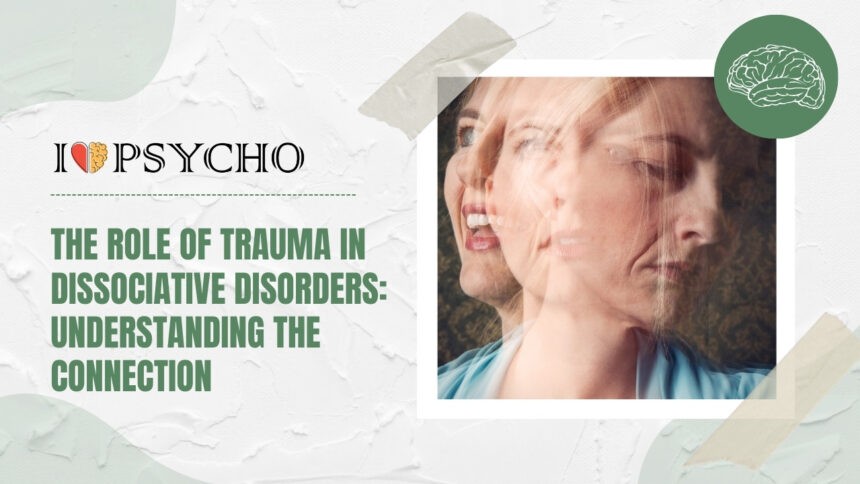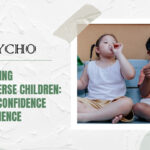Introduction to Dissociative Disorders
Welcome to a deep dive into the intricate connection between trauma and dissociative disorders. In this blog post, we will unravel the complexities surrounding how past experiences can shape our present realities. Join us on a journey to understand the profound impact of trauma on mental health and explore ways to navigate through its effects. Let’s embark on this enlightening exploration together!
How Trauma Can Lead to Dissociative Disorders
Trauma, whether experienced as a single event or over an extended period, can deeply impact the human psyche. When someone undergoes intense emotional or physical distress, their brain may respond by dissociating from the overwhelming pain. This disconnect serves as a defense mechanism to protect the individual from experiencing unbearable emotions associated with the trauma.
In cases where trauma is severe and prolonged, such as childhood abuse or neglect, the likelihood of developing dissociative disorders increases. The mind fragments to cope with ongoing stressors that exceed its capacity to process effectively. As a result, individuals may experience disruptions in memory, identity, perception of reality, and sense of self.
The journey from trauma to dissociative disorders is complex and multifaceted. It involves intricate interactions between genetic predispositions, environmental factors, neurobiological changes in the brain’s structure and function.
Understanding this connection highlights the importance of addressing trauma effectively through therapy and support systems to prevent long-term psychological consequences like dissociation from taking hold.
Types of Trauma and their Impact on the Brain
Trauma comes in various forms, each leaving a distinct imprint on the brain. Whether it’s physical abuse, emotional neglect, or witnessing violence, the impact can be profound.
For example, experiencing a car accident can trigger the amygdala to go into overdrive, leading to heightened fear responses. On the other hand, chronic stress from ongoing trauma can disrupt neural pathways that regulate emotions and memory.
Childhood trauma like abuse or neglect can alter brain development during critical periods, affecting cognitive functions and emotional regulation later in life. The hippocampus may shrink in response to prolonged stress, impairing memory and increasing vulnerability to dissociation.
Understanding how different types of trauma affect the brain is crucial in addressing dissociative disorders effectively. It highlights the importance of tailored therapies that target specific neurological changes caused by traumatic experiences.
The Impact of Childhood Trauma on Dissociative Disorders
Childhood trauma plays a significant role in the development of dissociative disorders. When children experience abuse, neglect, or other traumatic events during their formative years, it can have long-lasting effects on their mental health. The impact of childhood trauma on dissociation is profound and complex.
Exposure to chronic stress and adversity can disrupt the developing brain, leading to difficulties in emotional regulation and sense of self. Children who endure trauma may learn to dissociate as a coping mechanism to escape overwhelming emotions or memories. This can result in fragmented identities and gaps in memory.
The lasting effects of childhood trauma on dissociative disorders highlight the importance of early intervention and support for at-risk individuals. Understanding the link between past experiences and present symptoms is crucial for effective treatment strategies tailored to address underlying traumas.
Common Symptoms and Signs of Dissociative Disorders
Dissociative disorders are complex conditions that can manifest in various ways, making them challenging to identify. Individuals with dissociative disorders may experience memory gaps, where they cannot recall important personal information or events. These gaps can be distressing and disruptive to daily life.
Another common symptom is a sense of being detached from oneself or feeling like an outside observer of one’s thoughts, feelings, or actions. This feeling of depersonalization can lead to a lack of connection with one’s own identity and reality.
Individuals with dissociative disorders may also exhibit symptoms of derealization, where the external world feels unreal or distorted. This disconnection from reality can cause significant distress and confusion for the individual experiencing it.
Moreover, frequent amnesia episodes beyond typical forgetfulness could indicate dissociative amnesia, where significant personal memories are blocked out due to emotional trauma. These memory lapses are not due to medical conditions but rather as a defense mechanism against overwhelming experiences.
Recognizing these signs and symptoms is crucial in seeking appropriate support and treatment for individuals struggling with dissociative disorders.
Treatment Options for Trauma-Related Dissociative Disorders
When it comes to treating trauma-related dissociative disorders, there is no one-size-fits-all approach. It’s essential for individuals to work closely with mental health professionals who specialize in trauma and dissociation.
Therapy is a crucial component of treatment, with modalities such as cognitive behavioral therapy (CBT), dialectical behavior therapy (DBT), and eye movement desensitization and reprocessing (EMDR) showing effectiveness in helping individuals process traumatic experiences.
Medication may be prescribed to manage symptoms like anxiety or depression that often accompany dissociative disorders. However, the focus should primarily be on psychotherapy to address the root causes of the disorder.
In addition to traditional therapies, complementary approaches like mindfulness practices, art therapy, and yoga can also play a supportive role in healing from trauma-related dissociation. Each person’s journey towards recovery is unique; what works for one individual may not necessarily work for another.
Coping Strategies for Individuals with Dissociative Disorders
Living with dissociative disorders can be overwhelming, but there are coping strategies that individuals can incorporate into their daily lives to manage symptoms effectively. One helpful approach is grounding techniques, such as focused breathing or using sensory objects like a stress ball to stay connected to the present moment. Engaging in creative outlets like art therapy or journaling can also provide a safe space for self-expression and processing emotions.
Establishing a routine can create stability and predictability, helping individuals feel more in control of their day-to-day experiences. Seeking support from trusted friends, family members, or mental health professionals is crucial in navigating the challenges that come with dissociation. Additionally, practicing self-care activities like meditation, exercise, and healthy eating habits can promote overall well-being.
By exploring different coping mechanisms and finding what works best for them individually, those living with dissociative disorders can cultivate resilience and empower themselves on their healing journey. It’s important to remember that recovery is possible and that taking small steps towards self-care each day can make a significant difference in managing symptoms effectively.
Breaking the Stigma Surrounding Dissociative Disorders
Breaking the stigma surrounding dissociative disorders is crucial in fostering understanding and empathy towards those affected. Stigma often stems from misconceptions and lack of awareness about these complex mental health conditions. By educating ourselves and others, we can help debunk myths and stereotypes associated with dissociative disorders.
It’s important to approach individuals with dissociative disorders with compassion and respect, acknowledging the challenges they face. We must recognize that these conditions are not a choice but a result of past trauma or other underlying factors.
Creating an open dialogue about dissociative disorders can encourage people to seek help without fear of judgment. By sharing personal stories and experiences, we can humanize these conditions and show that recovery is possible with proper support.
Supporting research, advocacy efforts, and mental health initiatives focused on dissociative disorders can also contribute to reducing stigma in society. Together, we can work towards creating a more inclusive and accepting environment for individuals living with these challenging conditions.
Support and Resources for Those Affected by Trauma and Dissociation
Finding the right support and resources is crucial for individuals affected by trauma and dissociation. It’s essential to connect with professionals who specialize in treating these complex conditions. Therapists, psychologists, or psychiatrists experienced in trauma-informed care can provide valuable guidance and assistance.
Support groups are another beneficial avenue for those dealing with trauma-related dissociative disorders. Sharing experiences with others who understand your struggles can offer a sense of validation and camaraderie. Online forums, local community groups, or therapy sessions specifically tailored for dissociation can be helpful in fostering a supportive environment.
Additionally, seeking out educational materials such as books, articles, or podcasts on trauma and dissociation can enhance understanding and coping strategies. Knowledge is power when it comes to navigating the challenges associated with these disorders.
Remember that reaching out for help is a sign of strength, not weakness. There are numerous resources available to aid you on your healing journey – don’t hesitate to take advantage of them.
Conclusion
Understanding the connection between trauma and dissociative disorders is crucial in providing effective support and treatment for individuals affected by these conditions. By recognizing the impact of trauma on the brain and its role in triggering dissociation, we can work towards breaking the stigma surrounding dissociative disorders.
It’s essential to acknowledge that individuals with dissociative disorders have unique coping mechanisms and treatment needs based on their experiences. With proper intervention, therapy, and support from mental health professionals, family members, and peers, those affected by trauma-related dissociative disorders can experience healing and recovery.
By promoting awareness, understanding, empathy, and access to resources for those struggling with trauma-related dissociation, we can create a more supportive environment where individuals feel empowered to seek help without fear of judgment or misunderstanding. Together, we can foster a community that values mental health advocacy and provides hope for those navigating their journey towards healing from trauma-induced dissociative disorders.









